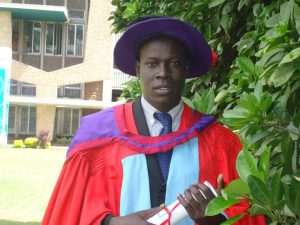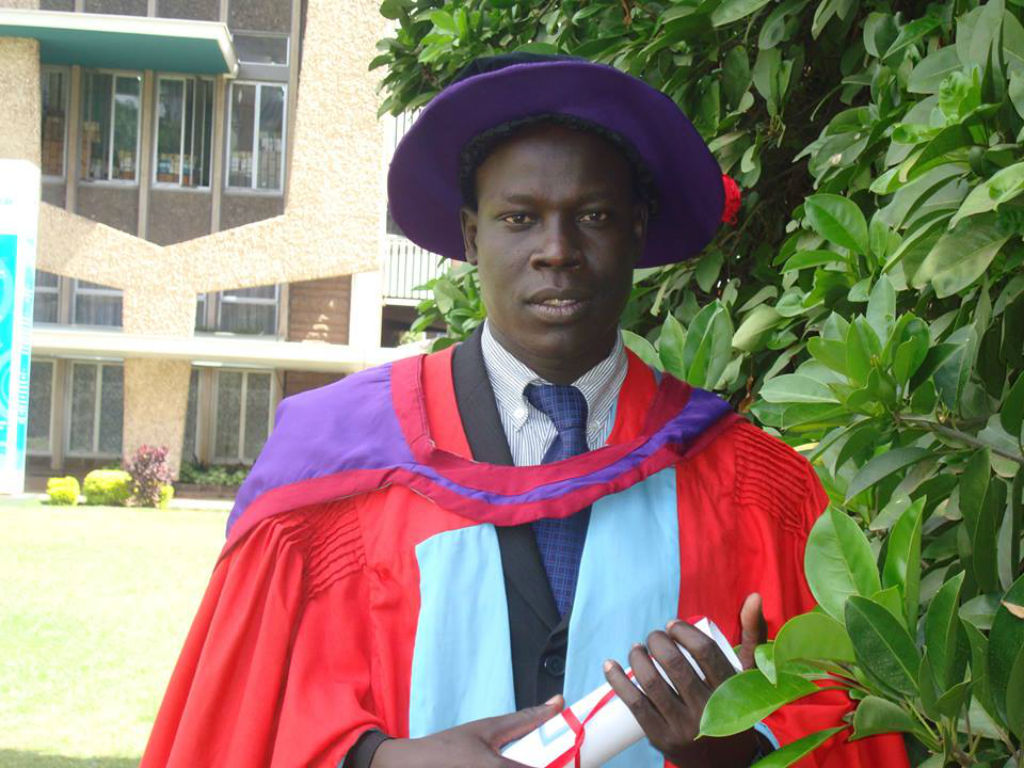
By James Okuk, PhD
October 20, 2019 (SSNA) — The coming of the members of UN Security Council to Juba with arrival of Dr Riek Machar and Dr Lam Akol to engage in high-level meetings on evaluation of the status of pre-transitional period as provided in the 2018 Revitalized Agreement on the Resolution of the Conflict in South Sudan (R-ARCSS) and finalization of the joint decisions on the pending pre-transitional tasks, is a welcome move but will this bring peace and unity? The experiences from the previous visits of the UNSC and face-to-face meetings of the leaders of the rivaling Partiers under external pressure have shown that the level of commitment usually gets beefed up for moving forward, especially when clear messages on what should be done are sent out by the head of the UNSC in unison with the 5 Permanent Members without mincing in diplomatic sugarcoating. Particularly, these leaders take faster steps forward when the USA states it categorically in a public statement that they want to see a change in conduct. With South Africa at the forefront of this call for urgent restoration of peace and security in South Sudan, it is highly probable that the tolerated defiance against the common good shall come to an end soon.
Now at the core of the unfinished and extended pre-transitional tasks of R-ARCSS is the long-awaited top-level political resolution of the number and boundaries of states, based on recommendations of defunct Technical Boundary Committee (TBC) and Independent Boundary Commission (IBC) as presented to the IGAD Executive Secretary and the Parties for urgent attention (since May and September 2019 respectively). The outcome of this consensus has to be incorporated together with other provisions R-ARCSS provisions into the 2011 Transitional Constitution of South Sudan (amended), on the basis of which the RTGoNU shall be formed legitimately. The other unfinished task is the enactment of the critical laws of the security and defense sector by the Transitional National Legislative Assembly and assent to all of these by the President of the Republic. Also the formation of RTGoNU has been conditioned by Article 2.2.1 of R-ARCSS, which requires completion of redeployment of jointly trained and unified necessary forces of the Parties during the pre-transition period so that they operate under One Commander-in-Chief, the President of the Republic, and discharge their duty of protection of the civilians and RTGoNU VIPs accordingly. The third key demand is for the Incumbent Transitional Government of National Unity (ITGoNU) to provide the necessary funds for facilitating all the pre-transitional tasks of the first phase of R-ARCSS implementation.
Given all the above, it is expected that the visit of the members of UNSC and coming back of Dr. Riek Machar and Dr. Lam Akol to Juba will create a better understanding by the R-ARCSS Parties for building consensus on the best practical options available to overcome the hurdles of formation of RTGoNU with full mandate for good governance, sustainable security, state-building reconstruction, reforms of government institutions, enforcement of transitional justice, post-conflict economic development, permanent constitution-making, and conduct of credible elections. The UNSC should remind the parties of their solemn commitment to objectives of the High-Level Revitalization Forum (HLRF)—permanent ceasefire and full implementation of R-ARCSS in letter and spirit based on realistic timelines, and culminating in realization of an internationally supervised credible elections after 3 years.
That means if there are provisions and implementation timelines of R-ARCSS that have become obsolete or too ambitious to complete in time, the Principals of the 5 Parties (i.e., ITGoNU, SPLM/A-IO, SSOA, FDs and Opp) should reach urgent consensus to amend these and avoid violations. For example, if they agree to form RTGoNU by 12th November without fulfilling article 2.2.1 on unification of the necessary forces under one command of the President of the Republic, then they need to amend this provision to eliminate the pre-condition. Otherwise, these Parties should go by the recommendations of the experts in the security and defense sector and accept a limited extension of the pre-transitional period until such task is completed satisfactorily for the RTGoNU to be formed in accordance with the letter and spirit of R-ARCSS. Also if the Parties think that reverting to 10 states will create another crisis because some communities don’t want to share their territorial states with others, it is high time they tell these rivaling ethnic groups that South Sudan can only be kept as a viable Republic when its diverse people learn to live harmoniously with each other in one place and time.
All in all, the UNSC and Principals of R-ARCSS Parties are expected to come out with one voice of peace and security, backed up by honest roadmap of safeguards for the welfare of the people and dignified future where every South Sudanese will be joyful to return home and engage constructively on developmental dividends and reclaiming their power through elections. The political leaders of South Sudan should start being seen visiting jointly and frequently the grassroots in collaboration with UNMISS, and demonstrating to the ordinary citizens by good examples that reconciliation for peace is possible and must be upheld as a priority from leaders to people at the local level. They should start becoming keenly conscious of the plight of the common citizens and take R-ARCSS as the only available opportunity for soft-landing as a carrot, and as a strategic rescue from facing the undesirable consequences from sticks of those who are discontented with the continuation of the bad status quo. They should learn to trust themselves on the possible and appreciatively consult the national academics, civil society activists, eminent persons and elders of religious institutions who are honest to tell the right truth courageously even when this does not please the egos of the superiors. They should learn from the past success stories and avoid repeating the same bad conduct that kept regenerating the conflict and crises in South Sudan. With patience and resilient determination, South Sudan will always remain a land of great abundance for every citizen to enjoy.
END THE WAR AS TOP RESPONSIBILITY, MAKE PEACE TO HOLD AS UTMOST PRIORITY AND BUILD THE NATION AND THE STATE WITH ALL CITIZENS ENJOYING DEVELOPMENTAL DIVIDENDS FROM THE RESOURCES AVAILABLE IN THE COUNTRY. NO RETURN TO WAR, BE IT WITH R-ARCSS OR WITH PLAN B. THIS IS WHAT THE PEOPLE OF SOUTH SUDAN WANT. OUR PEOPLE COME FIRST. IT IS THEIR PEACE THAT IS CORE.
Dr. James Okuk is a political Analyst and lecturer at the University of Juba. He can be reached him at [email protected].


1 Comment. Leave new
Dear James Okuk,what u mentioned is very Right my dear,in the country south Sudan i don,t see any way forward about the people of south ,kiir is not thinking about the suffering our people who are in other country.what could be the solution now since Dr is not agree with point that the government should be form on 12-November 2019